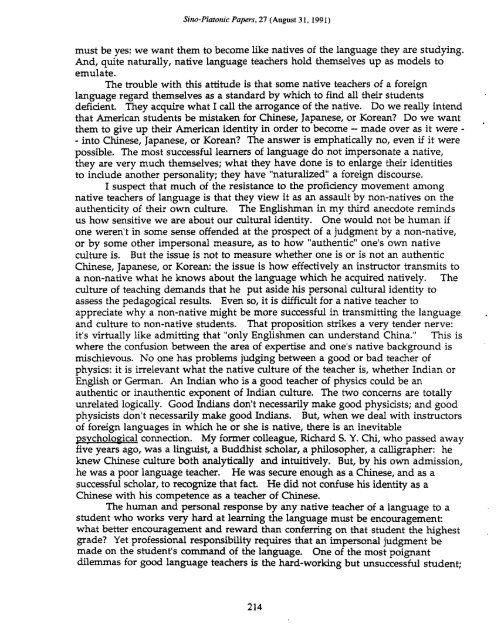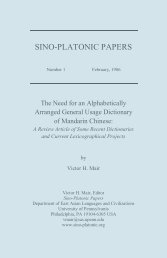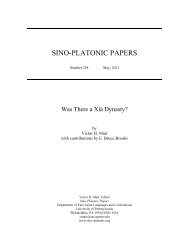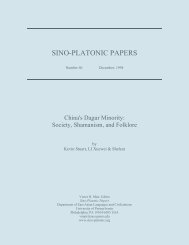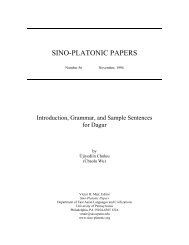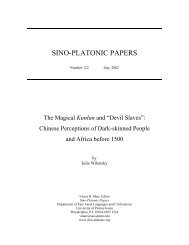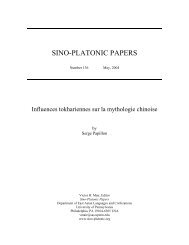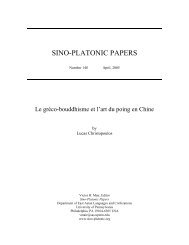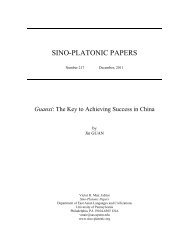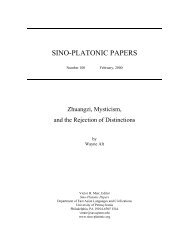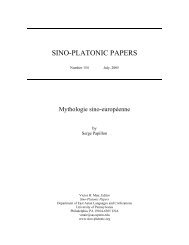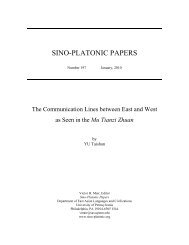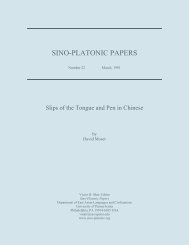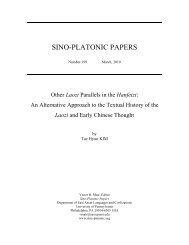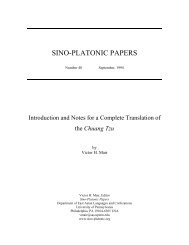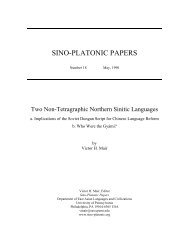Essays on Writing and Language in Honor - Sino-Platonic Papers
Essays on Writing and Language in Honor - Sino-Platonic Papers
Essays on Writing and Language in Honor - Sino-Platonic Papers
You also want an ePaper? Increase the reach of your titles
YUMPU automatically turns print PDFs into web optimized ePapers that Google loves.
S<strong>in</strong>o-Plut<strong>on</strong>ic <strong>Papers</strong>, 27 (August 3 1, 1 99 1 )<br />
must be yes: we want them to become like natives of the language they are study<strong>in</strong>g.<br />
And, quite naturally, native language teachers hold themselves up as models to<br />
emulate.<br />
The trouble with this attitude is that some native teachers of a foreign<br />
language regard themselves as a st<strong>and</strong>ard by which to f<strong>in</strong>d all their students<br />
deficient. They acquire what I call the arrogance of the native. Do we really <strong>in</strong>tend<br />
that American students be mistaken for Ch<strong>in</strong>ese, Japanese, or Korean? Do we want rn<br />
them to give up their American identity <strong>in</strong> order to become - made over as it were -<br />
- <strong>in</strong>to Ch<strong>in</strong>ese, Japanese, or Korean? The answer is emphatically no, even if it were<br />
possible. The most successful learners of language do not impers<strong>on</strong>ate a native,<br />
they are very much themselves; what they have d<strong>on</strong>e is to enlarge their identities<br />
to <strong>in</strong>clude another pers<strong>on</strong>ality; they have "naturalized" a foreign discourse.<br />
I suspect that much of the resistance to the proficiency movement am<strong>on</strong>g<br />
native teachers of language is that they view it as an assault by n<strong>on</strong>-natives <strong>on</strong> the<br />
authenticity of their own culture. The Enghshman <strong>in</strong> my third anecdote rem<strong>in</strong>ds<br />
us how sensitive we are about our cultural identity. One would not be human if<br />
<strong>on</strong>e weren't <strong>in</strong> some sense offended at the prospect of a judgment by a n<strong>on</strong>-native,<br />
or by some other impers<strong>on</strong>al measure, as to how "authentic" <strong>on</strong>e's own native<br />
culture is. But the issue is not to measure whether <strong>on</strong>e is or is not an authentic<br />
Ch<strong>in</strong>ese, Japanese, or Korean: the issue is how effectively an <strong>in</strong>structor transmits to<br />
a n<strong>on</strong>-native what he knows about the language which he acquired natively. The<br />
culture of teach<strong>in</strong>g dem<strong>and</strong>s that he put aside his pers<strong>on</strong>al cultural identity to<br />
assess the pedagogical results. Even so, it is difficult for a native teacher to<br />
appreciate why a n<strong>on</strong>-native might be more successful <strong>in</strong> transmitt<strong>in</strong>g the language A<br />
<strong>and</strong> culture to n<strong>on</strong>-native students. That propositi<strong>on</strong> strikes a very tender nerve:<br />
it's virtually like admitt<strong>in</strong>g that "<strong>on</strong>ly Englishmen can underst<strong>and</strong> Ch<strong>in</strong>a." This is<br />
where the c<strong>on</strong>fusi<strong>on</strong> between the area of expertise <strong>and</strong> <strong>on</strong>e's native background is<br />
mischievous. No <strong>on</strong>e has problems judg<strong>in</strong>g between a good or bad teacher of<br />
physics: it is irrelevant what the native culture of the teacher is, whether Indian or<br />
English or German. An Indian who is a good teacher of physics could be an<br />
authentic or <strong>in</strong>authentic exp<strong>on</strong>ent of Indian culture. The two c<strong>on</strong>cerns are totally<br />
unrelated logically. Good Indians d<strong>on</strong>'t necessarily make good physidsts; <strong>and</strong> good<br />
physidsts d<strong>on</strong>'t necessarily make good Indians. But, when we deal with <strong>in</strong>structors<br />
of foreign languages <strong>in</strong> which he or she is native, there is an <strong>in</strong>evitable<br />
psvcholoaical c<strong>on</strong>necti<strong>on</strong>. My former colleague, Richard S. Y. Chi, who passed away<br />
five years ago, was a l<strong>in</strong>guist, a Buddhist scholar, a philosopher, a calligrapher: he<br />
knew Ch<strong>in</strong>ese culture both analytically <strong>and</strong> <strong>in</strong>tuitively. But, by his own admissi<strong>on</strong>,<br />
he was a poor language teacher. He was secure enough as a Ch<strong>in</strong>ese, <strong>and</strong> as a<br />
successful scholar, to recognize that fact. He did not c<strong>on</strong>fuse his identity as a<br />
Ch<strong>in</strong>ese with his competence as a teacher of Ch<strong>in</strong>ese.<br />
The human <strong>and</strong> pers<strong>on</strong>al resp<strong>on</strong>se by any native teacher of a language to a<br />
student who works very hard at learn<strong>in</strong>g the language must be encouragement:<br />
what better encouragement <strong>and</strong> reward than c<strong>on</strong>ferr<strong>in</strong>g <strong>on</strong> that student the highest<br />
grade? Yet professi<strong>on</strong>al resp<strong>on</strong>sibility requires that an impers<strong>on</strong>al judgment be<br />
made <strong>on</strong> the student's comm<strong>and</strong> of the language. One of the most poignant<br />
dilemmas for good language teachers is the hard-work<strong>in</strong>g but unsuccessful student;


